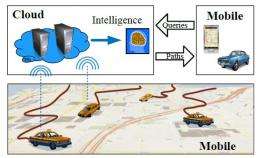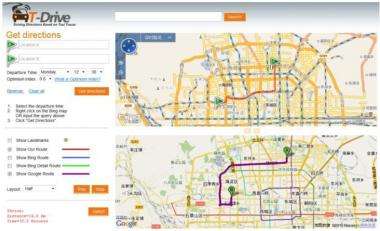November 8, 2010 report
Data from savvy cabbies to help improve online mapping

(PhysOrg.com) -- Microsoft is planning to tap into the intimate knowledge taxi drivers have of their cities to improve their online mapping systems and help drivers navigate to their destinations faster.
Microsoft Research Asia engineers are analyzing three months' worth of data from GPS units installed in more than 33,000 taxi cabs in Beijing in the hope of identifying the short cuts and side streets frequented by drivers who know the best routes to take at any given time.
To do the analysis, they designed a software program dubbed "T-Drive" to merge with satellite map information. Team leader Yu Zheng says the system outperforms the estimates provided by online mappers such as Google, Mapquest, and Bing, which use data on speed limits and the length of the road. These mapping systems can rarely help drivers select short cuts or routes around traffic light delays or jams.
Over 60 percent of T-Drive’s routes were faster than those provided by Google or Bing, and at least half of these results were 20 percent faster or better, giving an overall saving of 16 percent off the duration of the trip. This is equivalent to shaving an average of five minutes off per 30 minutes of traveling.

So far the system applies only to Beijing and does not yet include real-time data such as information on accidents or other hazards, but the system should eventually be real-time and applicable to any city with a large number of taxis on the road. Other systems are also being worked on, including a collaborative approach by Nokia and the University of California, which uses GPS information from motorists’ mobile phones.
Another system, from Silicon Valley company, Waze, allows drivers to share their real-time routes with online social networks to help other drivers adjust their routes to the current traffic conditions. Waze co-founder, Ehud Shabtai, said the Beijing approach makes sense, saying “you can probably assume routes taxi drivers take are more optimal,” and the best short cuts may not be known to less savvy drivers. Faster routes are also not always the shortest on the map, he said.
The T-Drive findings are being presented this week in San Jose, California at the International Conference on Advances in Geographic Information Systems.
More information:
-- T-Drive: research.microsoft.com/apps/pu … fault.aspx?id=138985
-- IEEE research paper (PDF): research.microsoft.com/pubs/138985/Drive%20smartly%20as%20a%20taxi%20driver-demo-IEEE.pdf
© 2010 PhysOrg.com


















